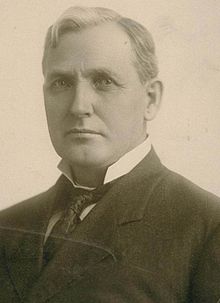James Gillett
James Norris Gillett (born September 20, 1860 in Viroqua , Vernon County , Wisconsin , † April 20, 1937 in Berkeley , California ) was the 22nd Governor of California and a member of the House of Representatives of the United States .
Early years
At the age of five, young James moved to Sparta , Wisconsin with his parents . He stayed there for the next 15 years and attended local schools. He studied law and was finally admitted to the bar in 1881. He reached Eureka , California, via Montana and the Washington Territory in 1884 . There he first joined the National Guard as a volunteer and then practiced as a lawyer. From 1890 to 1895 he worked as a public prosecutor for the city of Eureka.
Political rise
In the mid-1890s, Gillett discovered his interest in politics. He joined the Republican Party and was elected to the California Senate in 1896 . There he completed a term of office. He then successfully ran for the US House of Representatives. In the elections of 1904 he was confirmed in this mandate. His political success in Washington did not go unnoticed in California either. He became one of the delegates to the Republicans' electoral convention in Santa Cruz for the 1906 gubernatorial election. At that point, the conservative, business-friendly wing of the party had a majority. This group, even under the influence of the powerful Southern Pacific Railroad , was no longer ready to support the incumbent Governor George Pardee , who had also quarreled with this railway company, among other things. When looking for a loyal, industry-friendly candidate, they came across James Gillett, who was eventually nominated. This process met with public criticism, as the previous governor had been very popular with the public. Nevertheless, Gillett prevailed in the elections and was introduced to his new office on January 9, 1907.
Governor of California
As governor, he initially fulfilled the wishes of his political friends and advocated the expansion of rail connections to the east. He also promoted the expansion of the country's ports, especially the port in San Francisco , which had been particularly hard hit by the disaster of the 1906 earthquake . The emerging fruit and wine marketing in California was also promoted by him. The increasing number of automobiles in the country made it imperative to build an appropriate road network. Therefore, in 1909, the foundation stone was laid for the California road network, which already provided for street numbering. Gillett also campaigned for the reintegration of released convicts. Also in 1909 a law on the forced sterilization of the mentally handicapped, criminals and sex offenders was passed. This law remained in force until 1950. Around 19,000 people were forcibly sterilized during this time.
Despite some positive approaches, Governor Gillett remained controversial. His opponents saw in him only a puppet in the hands of the rich and powerful. Even in his own party he was not undisputed in this regard. In 1910 he got into financial difficulties and decided not to run again. It was believed that his wife had induced him to do this. In January 1911, Hiram Johnson took office at the top of California.
Old age and death
After retiring from governor's office, he ran a law firm in San Francisco. Between 1916 and 1920 he represented a California-based oil company in Washington. After he had retired from the legal business in 1929, he returned again in 1934 at the side of his son James Gillett Jr. as a senior partner in a law firm in Oakland . He died in Berkeley on April 20, 1937 at the age of 76.
Web links
- James Gillett in the Biographical Directory of the United States Congress (English)
- James Gillett in the database of Find a Grave (English)
- James Gilett in the National Governors Association (English)
- Profile the Governor's Library (English)
| personal data | |
|---|---|
| SURNAME | Gillett, James |
| ALTERNATIVE NAMES | Gillett, James Norris (full name) |
| BRIEF DESCRIPTION | American politician |
| DATE OF BIRTH | September 20, 1860 |
| PLACE OF BIRTH | Viroqua , Wisconsin |
| DATE OF DEATH | April 20, 1937 |
| Place of death | Berkeley , California |


